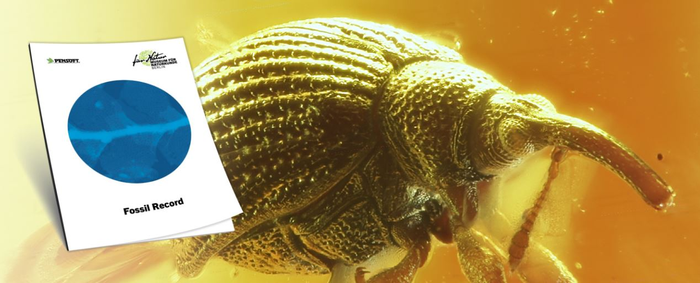Fossil Record – the paleontological scholarly journal of the Natural History Museum of Berlin (Museum für Naturkunde Berlin) published its first articles after moving to the academic publisher Pensoft and its publishing platform ARPHA in late 2021. The renowned scientific outlet – launched in 1998 – joined two other historical journals owned by the Museum: Deutsche Entomologische Zeitschrift and Zoosystematics and Evolution, which moved to Pensoft back in 2014.

Credit: Andrei Legalov, Natural History Museum of Berlin and Pensoft
Fossil Record – the paleontological scholarly journal of the Natural History Museum of Berlin (Museum für Naturkunde Berlin) published its first articles after moving to the academic publisher Pensoft and its publishing platform ARPHA in late 2021. The renowned scientific outlet – launched in 1998 – joined two other historical journals owned by the Museum: Deutsche Entomologische Zeitschrift and Zoosystematics and Evolution, which moved to Pensoft back in 2014.
Published in two issues a year, the open-access scientific outlet covers research from all areas of palaeontology, including the taxonomy and systematics of fossil organisms, biostratigraphy, palaeoecology, and evolution. It deals with all taxonomic groups, including invertebrates, microfossils, plants, and vertebrates.
As a result of the move to ARPHA, Fossil Record utilises the whole package of ARPHA Platform’s services, including its fast-track, end-to-end publishing module, designed to appeal to readers, authors, reviewers and editors alike. A major advantage is that the whole editorial process, starting from the submission of a manuscript and continuing into peer review, editing, publication, dissemination, archiving and hosting, happens within the online ecosystem of ARPHA.
As soon as they are published, the articles in Fossil Record are available in three formats: PDF, machine-readable JATS XML and semantically enriched HTML for better and mobile-friendly reader experience.
The publications are equipped with real-time metrics on both article and sub-article level that allow easy access to the number of visitors, views and downloads for every article and each of it’s figures, tables or supplementary materials. In their turn, the semantic enhancements do not only allow for easy navigation throughout the text and quick access to cited literature and the article’s own citations, but also tag each taxon that appears in the paper to provide links to further information concerning its occurrences, genomics, nomenclature, treatments and more as available from various databases.
The first five papers – now available on the brand new journal website powered by ARPHA – already demonstrate the breadth of topics covered by Fossil Record, including systematics, paleobiogeography, palaeodiversity and morphology, as well as the international appeal of the scholarly outlet. The articles are co-authored by collaborative research teams representing ten countries and spanning three continents: Europe, Asia and Africa.
***
Additional information:
About the Natural History Museum of Berlin:
The “Museum für Naturkunde – Leibniz Institute for Evolution and Biodiversity Science” is an integrated research museum within the Leibniz Association. It is one of the most important research institutions worldwide in the areas of biological and geological evolution and biodiversity.
The Museum’s mission is to discover and describe life and earth – with people, through dialogue. As an excellent research museum and innovative communication platform, it wants to engage with and influence the scientific and societal discourse about the future of our planet, worldwide. Its vision, strategy and structure make the museum an excellent research museum. The Natural History Museum of Berlin has research partners in Berlin, Germany and approximately 60 other countries. Over 700,000 visitors per year as well as steadily increasing participation in educational and other events show that the Museum has become an innovative communication centre that helps shape the scientific and social dialogue about the future of our earth.
About Pensoft:
Pensoft is an independent academic publishing company, well-known worldwide for its innovations in the field of semantic publishing, as well as for its cutting-edge publishing tools and workflows. In 2013, Pensoft launched the first ever end to end XML-based authoring, reviewing and publishing workflow, as demonstrated by the Pensoft Writing Tool (PWT), now upgraded to the ARPHA Publishing Platform. Flagship titles include: ZooKeys, PhytoKeys, MycoKeys, Biodiversity Data Journal, Neobiota, Research Ideas and Outcomes (RIO), Metabarcoding and Metagenomics (MBMG) and many more.
About ARPHA:
ARPHA is the first end-to-end, narrative- and data-integrated publishing solution that supports the full life cycle of a manuscript, from authoring to reviewing, publishing and dissemination. ARPHA provides accomplished and streamlined production workflows that can be customised according to the journal’s needs. The platform enables a variety of publishing models through a number of options for branding, production and revenue models to choose from.




